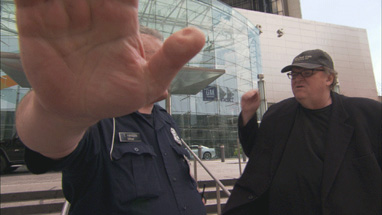Hollywood Psych: Michael Moore and Capitalism: A Love Story
By Sean Collier
September 21, 2009
The evening was far from a failure, but it was looking a bit comical. A planned rally converted into disinterested stargazing, and a by-the-numbers speech by Moore was far from a revolution; the march seemed to occur just to raise the question, "If a protest group marches down Penn Avenue but no one's there to see it, does it make a sound? Or count as effective rabble-rousing?"
The tenor of the evening would change dramatically at the theater.
Let's get this out of the way – Capitalism: A Love Story is almost certainly Moore's best film. Disregarding political leanings for a moment, he is more effective and thorough in his arguments here than in any of his films since Bowling for Columbine (and, unlike that film, Capitalism actually comes around to a conclusion.) He explores his topic from more angles and perspectives than in any of his other efforts, and relies more on evidence, expert analysis and history than sob stories and stunts. It's hard to leave the theater without being convinced by this movie, or at least considering Moore's position quite openly. This is more impressive given that he's making his most controversial point ever – that Capitalism is fundamentally, well, bad. That's a much harder argument to back up than, say, "George W. Bush is sort of dumb."
The true test – and, almost certainly, Moore's reason for agreeing to this unplanned premiere – was whether or not the group would buy it. Obviously, a group of labor delegates were going to support a strongly pro-middle class film, but would they be willing to go as far as Moore was? If he got radical, would these blue-collar workers – many from the south, the midwest, Texas, the rust belt – stay on board?
Moore received his answer in the form of near-constant roars of praise, from beginning to end. When someone made a point, they cheered. When a banker appeared on screen, they booed. And when Moore asked a priest what he thought of capitalism from a Christian perspective, and the priest quickly replied, "Capitalism is a sin, capitalism is wrong, and therefore has to be eliminated," the crowd erupted with approval, cheering over the next minute of the film.
When the end credits rolled, the standing ovation lasted for nearly ten minutes; it only ceased when Moore implored the audience to stop, so he could answer a few questions. He opened up the floor, but the vast majority of those who raised their hands had nothing to ask – they just thanked him, again and again.
Moore, of course, has made a career out of preaching to the choir, and this evening was not necessarily any different. This was a film aimed at workers, at the middle class, at those more trusting of people than banks, with more faith in priests than presidents. But what was surprising was how firmly this diverse crowd embraced a film that attacks capitalism categorically; while cable news would have us think that "real Americans" are bellowing at town hall meetings, it seems that Moore may be right – many Americans are fed up, and more than willing to consider radical change.
Towards the conclusion of the film, Moore shows a speech from one of Franklin Delano Roosevelt's later State of the Union addresses. In it, Roosevelt calls for a second bill of rights; a legal guarantee that Americans have the right not only to speech and assembly, but the right to a job, the right to health care, the right to a home, and the right to education. FDR's health was fading – he delivered this State of the Union from home, by radio – but he knew he was making a fairly radical point, and wanted the Second Bill of Rights preserved on film. The footage was set aside, and was lost after Roosevelt's death one year later; an archivist working for Moore unearthed it in an unmarked box in a hall of records in South Carolina.
The audience at the Byham Theater on Monday night was the first group of Americans to ever watch Roosevelt's speech. As FDR delivered a message that had been missing until that night, the room seemed full of exuberant hope, truly grateful and fully energized. Moore may have been been handed a captive, supportive audience, but he had delivered what they wanted, and seemed to have genuinely inspired 800 people.
Misguided marches and all other controversy aside, that's not bad for something they threw together over the weekend.
Continued:
1
2




